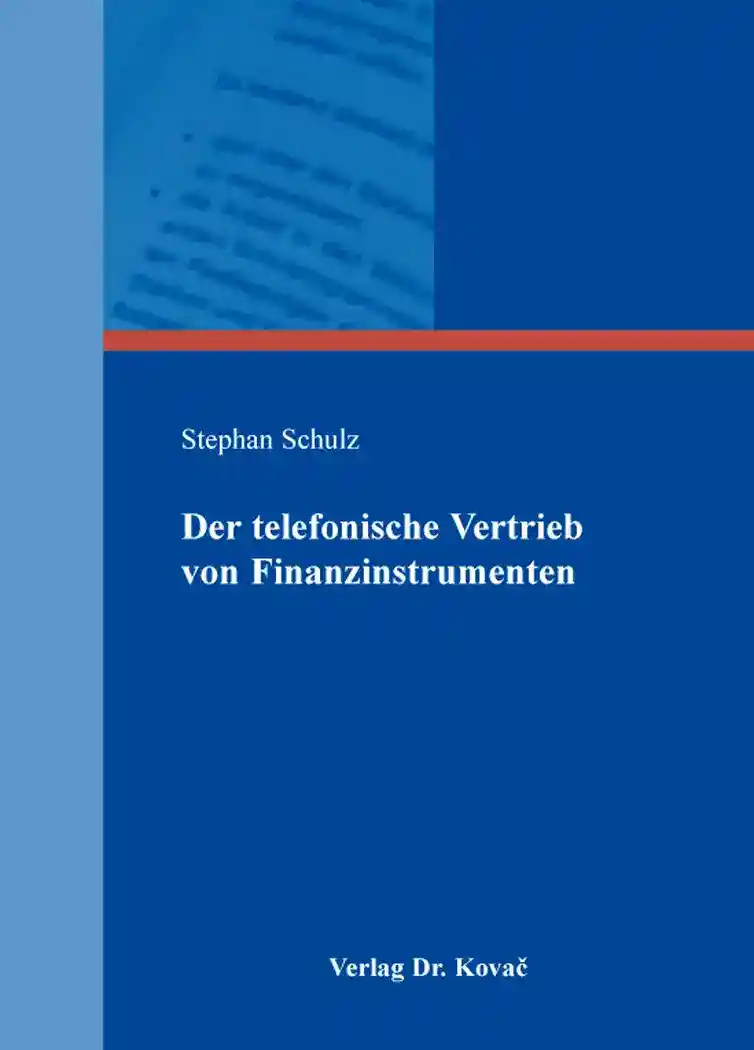Stephan SchulzDer telefonische Vertrieb von Finanzinstrumenten
Schriften zum Bank- und Kapitalmarktrecht, volume 1
Hamburg 2014, 274 pages
ISBN 978-3-8300-7768-8 (print)
ISBN 978-3-339-07768-4 (eBook)
About this book deutschenglish
The given thesis deals with the legal aspect of the distribution of financial instruments via telephone. Distribution of financial instruments means provision of services, which affect different complexes of the civil and the regulatory law, depending on the signatory, the modality and the financial instrument. Therefore, the thesis is thematically divided into single fields of law, which are analyzed with regards to consumer protection law, regulatory law and competition law. For banks, the telephone has a major role in the domain of customer relations. By that any customer is able to make an investment decision telephonically, without visiting a branch bank. Nevertheless, he does not have to abdicate his customer advisor or another contact person. Telephone contact enables sustainable administered customer relations, offering individual products or being present at all times. Decisions on financial instruments on the telephone come with particular risks. A customer can be put in a situation overburdening him, for example by an unannounced call, of which a bank employee could take advantage. On the other hand, banks must consider various guidelines concerning the distribution of financial instruments, which – when using distant communication – come with special liability risks. It had been controversial for a long time, if it was possible that, that private customers have the right of withdrawal (§§ 312b ff. BGB) because of a distant selling, when they contracted on the telephone. This relevant question is examined closely in the thesis. As a result, the right of withdrawal is negated. The aleatory character of these financial transactions unconditionally contradicts the structure of the right of withdrawal. Distributing via telephone the national regulatory law – especially the German WpHG – demands additional documentation and information from the banks. Furthermore the customer is entitled contractually with a specific week-long right of withdrawal (§ 34 Abs. 2a S. 4 WpHG), which may be used in case of an incorrect or incomplete transcript. In consideration of the upcoming financial instruments directive MiFID II the national regulatory law will develop considerably in the next future. One particular consequence is the planned duty to record transactions on the telephone, which has to be emphasized due to its impact on the legal practice. If the customer does not explicitly agree to an advertising call by a bank, this call prohibited (§ 7 Abs. 2 Nr. 2 UWG). In the past this requirement of a consent lead to great uncertainty in the field of retail banking, especially when the consent was based on a standardized procedure. In this context the thesis analyzes the practice-related jurisdiction of the Bundesgerichtshof, which recently led to the acceptance of consents in general terms and conditions. Lastly, the presented risk factors are overlapping analyzed with regards to their practical consequences. Thus the constant rise of administrative expense and additional liability risks – legislative as well as judicial – for the banks become apparent. Whether the constant growth of information, of which some are considered statutory duty whereas others are considered exculpation, will improve or restrain decisions for investments, remains to be seen. The distribution of financial instruments by telephone, however, remains indispensable due to its enormous practical and economic relevance.Your book at Dr. Kovač Publishing House
We publish your doctoral thesis >>
